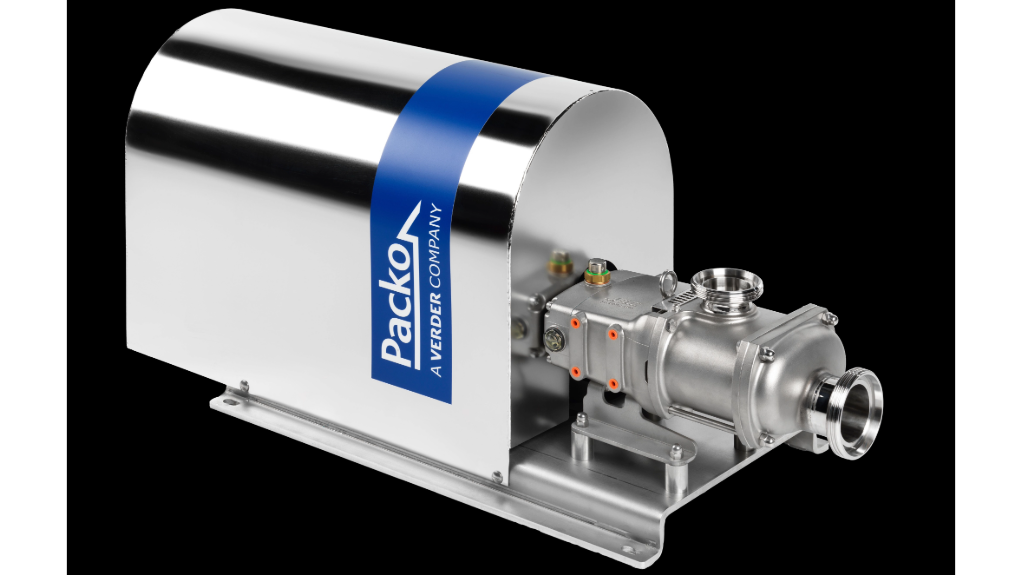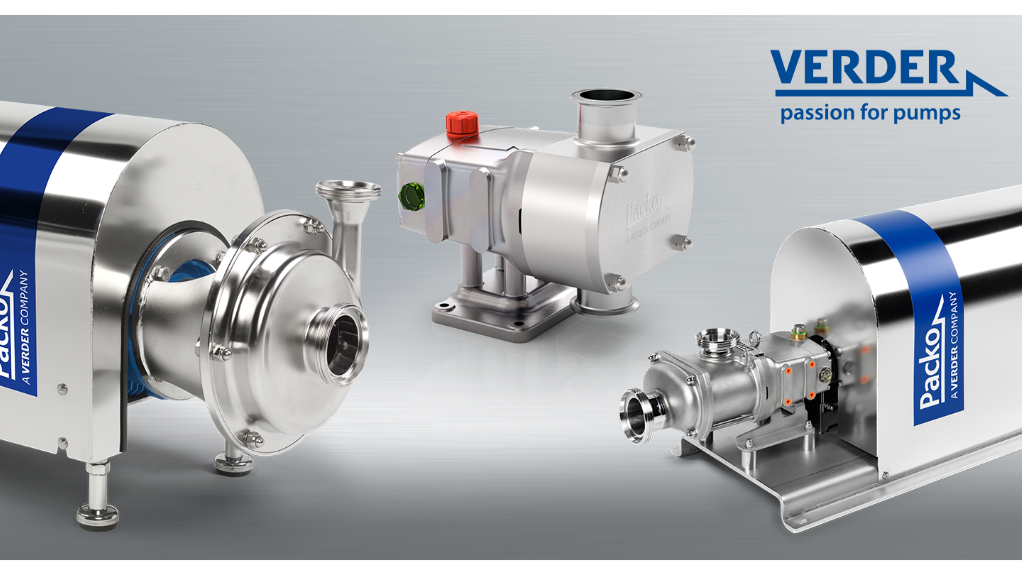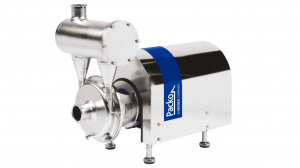Pipe supplier introduces three food processing innovations




PUMPS WITH POTENTIAL The range of pumps on offer from Verder meets local and international hygiene standards
WORLD CLASS PUMPS The Verder range of pumps ensure that food and beverages are sustainably produced and safe for consumption
HIGH-QUALITY PUMPING SOLUTIONS The Verder range of food processing pumps are cost-effective and efficient
In a world that is still adapting to post-Covid-19 consumer demand for “farm-to-plate freshness”, variety and convenience, there are two factors that continue to drive innovation in food technology: the need for food that is safe and shelf-stable, says Verder Pumps South Africa hygienic pump specialist Eddie le Roux.
These drivers are further complicated for producers by the need to achieve environmentally sustainable production facilities – and contribute to individual company, sector and national carbon reduction targets and net-zero objectives, while remaining profitable. To achieve all this, the food manufacturing industry must continue to seek out innovative industrial processing options, he explains.
The challenges of population growth, climate change, and shifting consumer demand puts technological innovations at the forefront of processing food in more prudent and sustainable ways. There are also three key innovations replacing heat and chemicals to keep food fresh and safe, which are already shaping the future of food processing.
The first is high-pressure processing, says Le Roux, which rapidly kills vegetative microbes and inactive viruses while denaturing enzymes that can cause food to spoil. This batch process applies high pressure of as much as 100 000 psi after packaging, minimising food treatment time and preserving nutrition and flavour.
Secondly, fermentation – far from a new food preservation process – is another area in which innovative technologies are key to improving sterility, preventing cross-contamination and ensuring scalability.
The newest application of fermentation is the production of cultured (or cell-based) and mycelial protein products, which alleviate the pressure on large-scale animal husbandry to produce enough animal protein to ensure food security, Le Roux comments. At the same time, alternative protein production technologies such as this reduce the greenhouse-gas emissions produced by animal protein production. Though not ‘mainstream’ yet, sterility is paramount in this kind of production facility, where clean in place (CIP) and sterilisation in place (SIP) are crucial.
The third innovation, aseptic processing and packaging, removes the need for refrigeration during transport and on store shelves for a variety of animal and plant-based products, liquid eggs, puddings, soups, vegetable purees, and bulk ingredients. The improvements in shelf stability are achieved by filling sterilised containers, in a sterile environment, with product that has been sterilised, usually by heating and then cooling before filling. This kills microbes in the food and prevents them from being reintroduced during packaging.
Le Roux noted that pumping solutions are often overlooked as an opportunity for improved shelf stability, environmental improvements, cost reduction and production capacity improvement. However, they are integral to every industrial processing facility. He adds that the right high-pressure – in the case of high-pressure processing – or hygienic pump solution is also crucial to successfully implementing these innovations in food safety.
"First and foremost, the pumping solution cleanability requirements must be designed to meet international and local hygiene standards – including CIP and SIP – as these can present many challenges for processors. Aseptic processing, for example, requires well-coordinated operations, as well as highly sterile and controlled environments. This is where hygienic pumps with a modular design can be integrated, allowing for streamlined disassembly, cleanability and reassembly."
Cross-contamination – a particular risk in fermentation processing facilities – can be mitigated through careful selection of equipment to maintain the highest hygiene standards. Fit-for-purpose hygienic pumping solutions that have been designed and built to eliminate any risk of contaminants during production are necessary for producers who want to stay ahead of the advances in fermentation technology, he stated.
As the food and beverages industry continues to evolve to ensure that food is safe, shelf stable and tasty, manufacturers must ensure their processes are reliable, repeatable and error-free. Integrating the right equipment is critical to food safety and sustainable production. Because the technical aspects of selecting the right pumping solutions for specific applications can be complex, food and beverage processors should look to a trusted and reputable brand that can offer not only a range of pumping solutions but 100% fit-for-purpose, application-specific remedies that are long-lasting, cost-effective and efficient, Le Roux concludes.
Article Enquiry
Email Article
Save Article
Feedback
To advertise email advertising@creamermedia.co.za or click here
Press Office
Announcements
What's On
Subscribe to improve your user experience...
Option 1 (equivalent of R125 a month):
Receive a weekly copy of Creamer Media's Engineering News & Mining Weekly magazine
(print copy for those in South Africa and e-magazine for those outside of South Africa)
Receive daily email newsletters
Access to full search results
Access archive of magazine back copies
Access to Projects in Progress
Access to ONE Research Report of your choice in PDF format
Option 2 (equivalent of R375 a month):
All benefits from Option 1
PLUS
Access to Creamer Media's Research Channel Africa for ALL Research Reports, in PDF format, on various industrial and mining sectors
including Electricity; Water; Energy Transition; Hydrogen; Roads, Rail and Ports; Coal; Gold; Platinum; Battery Metals; etc.
Already a subscriber?
Forgotten your password?
Receive weekly copy of Creamer Media's Engineering News & Mining Weekly magazine (print copy for those in South Africa and e-magazine for those outside of South Africa)
➕
Recieve daily email newsletters
➕
Access to full search results
➕
Access archive of magazine back copies
➕
Access to Projects in Progress
➕
Access to ONE Research Report of your choice in PDF format
RESEARCH CHANNEL AFRICA
R4500 (equivalent of R375 a month)
SUBSCRIBEAll benefits from Option 1
➕
Access to Creamer Media's Research Channel Africa for ALL Research Reports on various industrial and mining sectors, in PDF format, including on:
Electricity
➕
Water
➕
Energy Transition
➕
Hydrogen
➕
Roads, Rail and Ports
➕
Coal
➕
Gold
➕
Platinum
➕
Battery Metals
➕
etc.
Receive all benefits from Option 1 or Option 2 delivered to numerous people at your company
➕
Multiple User names and Passwords for simultaneous log-ins
➕
Intranet integration access to all in your organisation




















